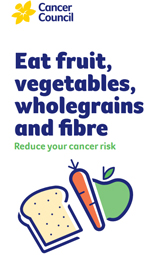- Home
- Cancer Prevention
- Diet and exercise
- Food and nutrition
- Ultra-processed and fast foods
Ultra-processed and fast foods
Ultra-processed foods are those that have undergone significant levels of processing, so that they don’t resemble the raw ingredients they are made from. Ultra-processed foods include soft drinks, chips, chocolate, lollies, ice-cream, sugary cereals, pies, processed meats and fast foods.
Ultra-processed foods include many food additives, and the processes and ingredients used to produce them make them convenient, non-perishable, intensely flavoured, easy to eat in large quantities, and often inexpensive to buy. Unfortunately, this high level of processing decreases the food’s nutritional value and can increase its energy content.
In recent years, there have been large increases in the amount and types of ultra-processed foods available. Unfortunately, these foods appear cheaper when compared with minimally or un-processed foods like vegetables, wholegrains, legumes, fruits, lean meats, fish, dairy products and their alternatives.
Ultra-processed foods and cancer
Although the link between ultra-processed foods and cancer is not well established, eating these foods often or in large quantities may contribute to increased cancer risk.
Firstly, they contain high levels of energy, saturated fat, added sugars and sodium, and are low in nutrients such as vitamins and minerals. If we eat too many ultra-processed foods, we may not eat enough of the foods in the diet that we know can help prevent cancer, such as wholegrains, fruit and vegetables.
Secondly, consuming these foods regularly can lead to weight gain. Being above a healthy weight increases your risk of developing 13 different cancers, including cancers of the bowel, kidney, pancreas, oesophagus, endometrium, liver and breast (after menopause).
The Australian Dietary Guidelines recommends that discretionary foods like ultra-processed foods should only be eaten sometimes and in small portions.
How to eat less ultra-processed foods
- Limit how often you eat these foods and look for smaller serves.
- Limit foods such as cakes and biscuits, lollies and other confectionery crisps and processed meats. Try our home made oat, sultana and peach bread for a sweet snack.
- Limit fast foods. Foods like pizza, burgers and fries can contain very little nutrients and can be high in energy, total and saturated fats, sodium and sugars.
- Check the menu of the restaurant or food outlet. Many provide fresh and healthy options. Avoid deep-fried items. Instead, choose baked, grilled, poached or stir-fried items with lots of vegetables. Check out the Healthy Made Tasty healthy takeaway guide for other ideas.
- Enjoy home cooked meals or ‘fakeaways’. Cook at home more often with fresh ingredients – and cook extra for left overs! See the Healthy Made Tasty website for quick, easy and freezer friendly recipes.
- Read the label and check the ingredients list. Choose foods with only a few ingredients and that you recognise and would use in your own cooking.
- See the healthy swaps section on the Healthy Made Tasty website for simple swaps you can make to improve the quality of your snacks.
Featured resource
Learn how to reduce your cancer risk by eating fruit, vegetables, wholegrains and fibre.

Eat fruit, vegetables, wholegrains and fibre
Learn how to reduce your cancer risk by eating fruit, vegetables, wholegrains and fibre.
Download PDF298kB